Publications
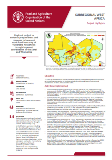
Subregional West Africa: Project Highlights - OSRO/INT/103/USA
05/2023
The project entitled “Regional project to enhance preparedness and response to increased acute food insecurity of vulnerable households through improved coordination in the Sahel and West Africa" funded by the Government of the United States of America through its Bureau for Humanitarian Assistance aimed at scaling up humanitarian and resilience response by strengthening national capacities on innovative approaches to food security and resilience...
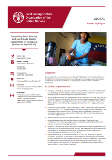
Global: Project Highlights - OSRO/GLO/027/USA
05/2023
The project entitled “Supporting Food Security and Livelihoods Cluster coordination in Venezuela (Bolivarian Republic)” funded by the Government of the United States of America through its Bureau for Humanitarian Assistance, was designed to strengthen the Food Security and Livelihoods Cluster by developing a harmonized programmatic approach and coordinating an effective response, in order to contribute to improving the food security of affected populations.

Progressive Management Pathway for Terrestrial Animal Biosecurity (FAO-PMP-TAB)
05/2023
FAO defines biosecurity as a strategic and integrated approach to analyzing and managing risks to human, animal and plant life and health, and associated environmental risks to the environment.
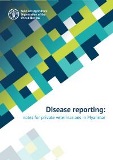
Disease reporting: Notes for private veterinarians in Myanmar
05/2023
A sensitive and effective disease surveillance system, providing early warning of outbreaks, is essential for effective control, reporting and communication of disease occurrence. It is an integral component of emergency preparedness.
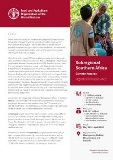
Subregional Southern Africa – Climate hazards: Urgent call for assistance
05/2023
Between January and March 2023, Tropical Cyclone Freddy – the most energetic cyclone on record – and Tropical Storm Cheneso battered Malawi, Madagascar and Mozambique. At the same time, Zambia experienced destructive storms and torrential rains that resulted in severe flooding, affecting large swaths of inhabited and cropped lands.
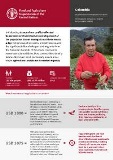
Colombia: 2023 Humanitarian Response Plan (HRP); 2023 Regional Refugee and Migrant Response Plan (RMRP)
05/2023
In Colombia, six out of ten conflict-affected households are food insecure and 26 percent of the population do not manage to eat three meals a day.

COVID-19 response: Strengthening local agricultural supply chains
05/2023
The emergence of COVID-19 greatly impacted countries already grappling with challenges, such as civil unrest, conflict, climate shocks (such as drought and flooding), economic crises and desert locust.
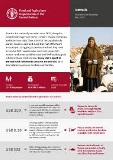
Somalia: Humanitarian Response Plan 2023
05/2023
Somalia has endured poor rains since 2020, alongside exceptionally high food prices, conflict, disease outbreaks and other hardships.
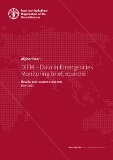
Afghanistan: DIEM – Data in Emergencies Monitoring brief, round 6
05/2023
This Data in Emergencies Monitoring (DIEM-Monitoring) brief shares the results of a sixth-round assessment conducted between January and February 2023 in Afghanistan.
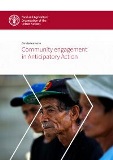
Guidance note: Community engagement in Anticipatory Action
05/2023
The guidance note offers information and recommendations to FAO Country Offices and partners involved in Anticipatory Action programming on how to engage affected and at-risk people and communities to better understand their risks, needs, priorities and capacities.
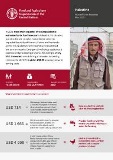
Palestine: Humanitarian Response Plan 2023
05/2023
In 2023, more than a quarter of the population is estimated to be food insecure in Palestine.

Türkiye: Earthquake response and recovery plan, 2023–2026
05/2023
The earthquakes that struck Türkiye on February 2023 had a devastating impact on the agriculture and rural sectors.
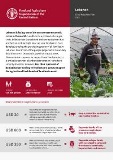
Lebanon: Crisis Response Plan 2023
05/2023
Lebanon is facing one of the most severe economic crises in the world in addition to a protracted refugee crisis. Inflation has skyrocketed and unemployment has reached an all-time high.
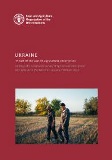
Ukraine: Impact of the war on agricultural enterprises
04/2023
The Food and Agriculture Organization of the United Nations in Ukraine has conducted a nationwide survey of agricultural enterprises with land up to 250 hectares.
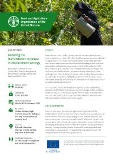
Project brief: Greening the humanitarian response in displacement settings
04/2023
The scale and protracted nature of displacement today highlights more than ever the need to integrate environmental preparedness and response in humanitarian interventions.

Syrian Arab Republic: Earthquake response and recovery plan, 2023–2026
04/2023
The earthquakes that struck the Syrian Arab Republic on 6 February 2023 caused major damages and losses, affecting both urban and rural areas.

Monitoring food security in food crisis countries and territories with conflict situations
04/2023
This is the twelfth update of the Monitoring food security in food crisis countries and territories with conflict situations.
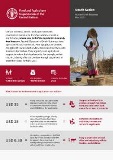
South Sudan: Humanitarian Response Plan 2023
04/2023
Climate extremes, conflict and a poor economic environment continue to drive humanitarian needs in South Sudan, where over half of the population is acutely food insecure.
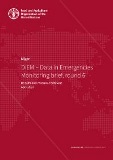
Niger: DIEM – Data in Emergencies Monitoring brief, round 6
04/2023
This Data in Emergencies Monitoring (DIEM-Monitoring) brief shares the results of a sixth-round assessment conducted between February and March 2023 in Niger.

